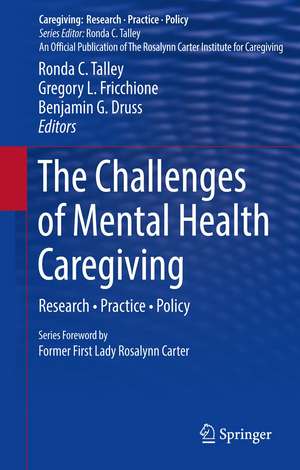The Challenges of Mental Health Caregiving: Research • Practice • Policy: Caregiving: Research • Practice • Policy
Editat de Ronda C. Talley, Gregory L. Fricchione, Benjamin G. Drussen Limba Engleză Hardback – 16 noi 2013
The Challenges of Mental Health Caregiving addresses the complexities of the situation with uncommon depth and breadth. Suited to researchers, scientist-practitioners and clinicians, and students seeking a rounded understanding of the field, it examines how caregiving affects the lives, work, and mental health of family and professional caregivers. Chapters explore developmental, cultural, and spiritual contexts of care, addressing ongoing concerns about care in relation to larger health systems and emphasizing the need for care to be viewed as a community, rather than an individual or family experience. Further, the book's conclusion strongly advocates for more effective and efficient uses for available funds and resources while offering workable proposals for service improvements at the policy level.
Key areas of coverage:
- The impact of caregiving on physical and mental health.
- Integrating mental health and primary care.
- The promotion of positive mental health outcomes in children and youth.
- Mid-life concerns and caregiver experience.
- Loss, grief, bereavement and the implications for mental health caregiving.
- Policy issues incaregiving and mental health.
The Challenges of Mental Health Caregiving is a clear-sighted reference for researchers, clinicians and scientist-practitioners, and graduate students in the caregiving fields, including clinical psychology, social work, public health/medicine, geriatrics/gerontology, public policy, and educational policy.
| Toate formatele și edițiile | Preț | Express |
|---|---|---|
| Paperback (1) | 366.91 lei 6-8 săpt. | |
| Springer – 23 aug 2016 | 366.91 lei 6-8 săpt. | |
| Hardback (1) | 393.52 lei 6-8 săpt. | |
| Springer – 16 noi 2013 | 393.52 lei 6-8 săpt. |
Preț: 393.52 lei
Nou
Puncte Express: 590
Preț estimativ în valută:
75.30€ • 78.62$ • 62.32£
75.30€ • 78.62$ • 62.32£
Carte tipărită la comandă
Livrare economică 04-18 aprilie
Preluare comenzi: 021 569.72.76
Specificații
ISBN-13: 9781461487906
ISBN-10: 1461487900
Pagini: 250
Ilustrații: XXVI, 234 p. 4 illus.
Dimensiuni: 155 x 235 x 22 mm
Greutate: 0.54 kg
Ediția:2014
Editura: Springer
Colecția Springer
Seria Caregiving: Research • Practice • Policy
Locul publicării:New York, NY, United States
ISBN-10: 1461487900
Pagini: 250
Ilustrații: XXVI, 234 p. 4 illus.
Dimensiuni: 155 x 235 x 22 mm
Greutate: 0.54 kg
Ediția:2014
Editura: Springer
Colecția Springer
Seria Caregiving: Research • Practice • Policy
Locul publicării:New York, NY, United States
Public țintă
ResearchCuprins
Foreword; Rosalynn Carter.- Chapter 1. Caregiving to Promote Mental Health and Prevent Mental Illness; Ronda C. Talley, Gregory L. Fricchione, & Benjamin G. Druss.- Section I: Developmental Issues in Mental Health Caregiving.- Chapter 2. The Impact of Caregiving on Physical and Mental Health: Implications for Research, Practice, Education, and Policy; Diane L. Elmore.- Chapter 3. Cultural Considerations in Caring for Persons with Mental Illness; Brent E. Gibson. - Chapter 4. Chronic Illness and Primary Care: Integrating Mental Health and Primary Care; Susan Taylor-Brown & Susan H. McDaniel.- Section II: The Mental Health Caregiving Context.- Chapter 5. Mental Illness Prevention and Promotion; William R. Beardslee & Tracy R. G. Gladstone.- Chapter 6. Systems of Caregiving: Promoting Positive Mental Health Outcomes in Children and Adolescents; Patricia Stone Motes & Chaundrissa Oyeshiku Smith.- Chapter 7. Midlife Concerns and Caregiving Experiences: Intersecting Life Issues Affecting Mental Health; Jane E. Myers & Melanie C. Harper.- Section III: Local, State, and National Issues Effecting Caregivers and Mental Health Caregiving.- Chapter 8. Loss, Grief, and Bereavement: Implications for Family Caregivers and Health Care Professionals of the Mentally Ill; Sherry R. Schachter & Jimmie C. Holland.- Chapter 9. Caring for a Family Member with Mental Illness: Exploring Spirituality; Thomas R. Smith & Mary G. Milano.- Section IV: Issues in Policy and Research.- Chapter 10. Caregiving and Mental Health: Policy Implications; Michael J. English & Kana Enomoto.- Chapter 11. Research in Caregiving; Elizabeth A. Crocco & Carl Eisdorfer.- Chapter 12. Mental Health Caregiving: A Call to Professional Providers, Family Caregivers, and Individuals with Mental Health Challenges; Donald Lollar & Ronda C. Talley.
Notă biografică
Ronda C. Talley, PhD, MPH, is the Executive Director of the Suzanne Vitale Clinical Education Complex at Western Kentucky University and Professor of Psychology. Her prior work experience includes serving as Executive Director of the Rosalynn Carter Institute for Caregiving; Associate Director of Legislation, Policy, and Planning/Health Scientist at the Centers for Disease Control and Prevention; and Associate Executive Director at the American Psychological Association. Dr. Talley received the Outstanding Alumni Award from Indiana University and the Jack Bardon Distinguished Service Award from the Division of School Psychology of the American Psychological Association.
Gregory L. Fricchione, MD, is Director of the Benson-Henry Institute for Mind Body Medicine at Massachusetts General Hospital. He also serves as Associate Chief of Psychiatry at MGH and is a Professor of Psychiatry at Harvard Medical School. He is a 1978 graduate of the New York University School of Medicine and did his postgraduate training in psychiatry at NYU-Bellevue and in psychosomatic medicine at Massachusetts General Hospital. From 2000 to 2002, he served as Director of the Mental Health Task Force at the Carter Center in Atlanta, Georgia, while on leave of absence from HMS. While there he worked with Mrs. Rosalynn Carter and former President Jimmy Carter on public and international mental health issues and policy. Dr. Fricchione has published more than 100 journal articles and has co-authored five books. He has overall responsibility for the clinical, educational and research missions of BHI.
Benjamin G. Druss, MD, MPH, is Professor of Health Policy and Management andBehavioral Sciences and Health Education at the Rollins School of Health, Emory University. As the first Rosalynn Carter Chair in Mental Health at Emory University, Dr. Druss is working to build linkages between mental health, general medical health, and public health. He works closely with Carter Center Mental Health Program, where he is a member of the Mental Health Task Force and Journalism Task Force. He has been a member of two Institute of Medicine Committees and has served as an expert consultant to the Substance Abuse and Mental Health Services Administration, the Centers for Disease Control, and the Assistant Secretary for Planning and Evaluation.
Dr. Druss’s research focuses on improving physical health and healthcare among persons with serious mental disorders. He has published more than 100 peer-reviewed articles on this and related topics, including the first randomized trial of an intervention to improve medical care in this population in 2001. His research is funded by grants from the National Institute of Mental Health and the Agency for Healthcare Quality and Research, and he serves as a standing member of an NIMH study section. He has received a number of national awards for his work, including the American Psychiatric Association Early Career Health Services Research Award, the AcademyHealth Article-of-the-Year Award, and the AcademyHealth Alice S. Hersh New Investigator Award.
Gregory L. Fricchione, MD, is Director of the Benson-Henry Institute for Mind Body Medicine at Massachusetts General Hospital. He also serves as Associate Chief of Psychiatry at MGH and is a Professor of Psychiatry at Harvard Medical School. He is a 1978 graduate of the New York University School of Medicine and did his postgraduate training in psychiatry at NYU-Bellevue and in psychosomatic medicine at Massachusetts General Hospital. From 2000 to 2002, he served as Director of the Mental Health Task Force at the Carter Center in Atlanta, Georgia, while on leave of absence from HMS. While there he worked with Mrs. Rosalynn Carter and former President Jimmy Carter on public and international mental health issues and policy. Dr. Fricchione has published more than 100 journal articles and has co-authored five books. He has overall responsibility for the clinical, educational and research missions of BHI.
Benjamin G. Druss, MD, MPH, is Professor of Health Policy and Management andBehavioral Sciences and Health Education at the Rollins School of Health, Emory University. As the first Rosalynn Carter Chair in Mental Health at Emory University, Dr. Druss is working to build linkages between mental health, general medical health, and public health. He works closely with Carter Center Mental Health Program, where he is a member of the Mental Health Task Force and Journalism Task Force. He has been a member of two Institute of Medicine Committees and has served as an expert consultant to the Substance Abuse and Mental Health Services Administration, the Centers for Disease Control, and the Assistant Secretary for Planning and Evaluation.
Dr. Druss’s research focuses on improving physical health and healthcare among persons with serious mental disorders. He has published more than 100 peer-reviewed articles on this and related topics, including the first randomized trial of an intervention to improve medical care in this population in 2001. His research is funded by grants from the National Institute of Mental Health and the Agency for Healthcare Quality and Research, and he serves as a standing member of an NIMH study section. He has received a number of national awards for his work, including the American Psychiatric Association Early Career Health Services Research Award, the AcademyHealth Article-of-the-Year Award, and the AcademyHealth Alice S. Hersh New Investigator Award.
Textul de pe ultima copertă
Caring for the ill, disabled, very old, or very young requires a labor-intensive commitment that is not only essential to the well-being of individuals and to society as a whole, but also fraught with physical, financial, and psychological risks. And despite the critical nature of their job, caregivers rarely have avenues of support.
The Challenges of Mental Health Caregiving addresses the complexities of the situation with uncommon depth and breadth. Suited to researchers, scientist-practitioners and clinicians, and students seeking a rounded understanding of the field, it examines how caregiving affects the lives, work, and mental health of family and professional caregivers. Chapters explore developmental, cultural, and spiritual contexts of care, addressing ongoing concerns about care in relation to larger health systems and emphasizing the need for care to be viewed as a community, rather than an individual or family experience. Further, the book's conclusion strongly advocates for more effective and efficient uses for available funds and resources while offering workable proposals for service improvements at the policy level.
Key areas of coverage:
The Challenges of Mental Health Caregiving is a clear-sighted reference for researchers, clinicians and scientist-practitioners, and graduate students in the caregiving fields, including clinical psychology, social work, public health/medicine, geriatrics/gerontology, public policy, and educational policy.
The Challenges of Mental Health Caregiving addresses the complexities of the situation with uncommon depth and breadth. Suited to researchers, scientist-practitioners and clinicians, and students seeking a rounded understanding of the field, it examines how caregiving affects the lives, work, and mental health of family and professional caregivers. Chapters explore developmental, cultural, and spiritual contexts of care, addressing ongoing concerns about care in relation to larger health systems and emphasizing the need for care to be viewed as a community, rather than an individual or family experience. Further, the book's conclusion strongly advocates for more effective and efficient uses for available funds and resources while offering workable proposals for service improvements at the policy level.
Key areas of coverage:
- The impact of caregiving on physical and mental health.
- Integrating mental health and primary care.
- The promotion of positive mental health outcomes in children and youth.
- Mid-life concerns and caregiver experience.
- Loss, grief, bereavement and the implications for mental health caregiving.
- Policy issues incaregiving and mental health.
The Challenges of Mental Health Caregiving is a clear-sighted reference for researchers, clinicians and scientist-practitioners, and graduate students in the caregiving fields, including clinical psychology, social work, public health/medicine, geriatrics/gerontology, public policy, and educational policy.
Caracteristici
Provides a broad overview on promoting mental well-being across the lifespan Examines how caregiving affects physical and psychological health Reviews cultural considerations of caring for persons with mental illness Explores how to integrate mental health into primary care Discusses the implications of loss, grief, and bereavement for family caregivers and professional health care providers of the mentally ill? Includes supplementary material: sn.pub/extras





















